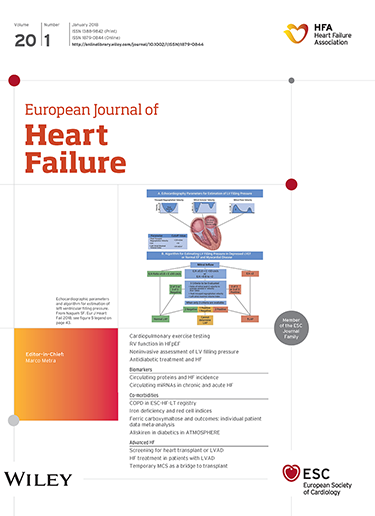Higher hospital volume is associated with lower mortality for patients with cardiogenic shock and mechanical circulatory support
IF 10.8
1区 医学
Q1 CARDIAC & CARDIOVASCULAR SYSTEMS
引用次数: 0
Abstract
AimsMortality for cardiogenic shock (CS) remains high. To improve outcomes, centralization of treatment in specialized centres, especially those with expertise in mechanical circulatory support (MCS), has been recommended. High‐volume centres may be able to provide standardized, better care. We analysed associations between centre volume and outcomes in Germany, a large country with multiple types of CS centres.Methods and resultsBased on data from all CS patients treated in Germany from 2017–2021, the association between annual CS/MCS hospital volume and in‐hospital mortality was assessed using adjusted Cox‐regression, and spline plots were used to assess case thresholds. Overall, 220 223 CS patients underwent treatment at 1232 hospitals; 435/1232 (35%) of these performed MCS therapy, although only few hospitals (60/435, 14%) performed >25 MCS cases per year on average. Treatment at hospitals with a higher annual volume of CS and MCS cases was associated with a significantly lower mortality risk as compared to hospitals with a lower volume (upper third vs. lower two‐thirds; CS: hazard ratio [HR] 0.92, 95% confidence interval [CI] 0.91–0.94;较高的医院容量与心源性休克和机械循环支持患者的较低死亡率相关
目的心源性休克(CS)的死亡率仍然很高。为了改善结果,建议在专门的中心集中治疗,特别是那些具有机械循环支持(MCS)专业知识的中心。大容量中心可能能够提供标准化的、更好的护理。我们分析了德国中心数量与结果之间的关系,德国是一个拥有多种类型CS中心的大国。方法和结果基于2017-2021年在德国接受治疗的所有CS患者的数据,使用调整后的Cox回归评估年度CS/MCS医院容量与院内死亡率之间的关系,并使用样条图评估病例阈值。总体而言,220223名CS患者在1232家医院接受了治疗;其中435/1232(35%)进行了MCS治疗,尽管只有少数医院(60/435,14%)平均每年治疗25例MCS病例。与数量较少的医院相比,每年接收CS和MCS病例较多的医院的治疗与较低的死亡风险相关(三分之一以上vs三分之二以下;CS:风险比[HR] 0.92, 95%可信区间[CI] 0.91-0.94; p < 0.001; MCS: HR 0.80, 95% CI 0.76-0.84; p < 0.001)。这些关联是连续的,没有可检测到的天花板效应,样条图显示病例阈值至少为每年90例CS /25例MCS。结论:在大量使用CS和MCS的医院中,接受和不接受MCS治疗的CS患者的恐慌与较低的院内死亡率相关。这一分析表明,在专门的中心集中治疗大量的CS和MCS患者可能会改善结果。
本文章由计算机程序翻译,如有差异,请以英文原文为准。
求助全文
约1分钟内获得全文
求助全文
来源期刊

European Journal of Heart Failure
医学-心血管系统
CiteScore
27.30
自引率
11.50%
发文量
365
审稿时长
1 months
期刊介绍:
European Journal of Heart Failure is an international journal dedicated to advancing knowledge in the field of heart failure management. The journal publishes reviews and editorials aimed at improving understanding, prevention, investigation, and treatment of heart failure. It covers various disciplines such as molecular and cellular biology, pathology, physiology, electrophysiology, pharmacology, clinical sciences, social sciences, and population sciences. The journal welcomes submissions of manuscripts on basic, clinical, and population sciences, as well as original contributions on nursing, care of the elderly, primary care, health economics, and other related specialist fields. It is published monthly and has a readership that includes cardiologists, emergency room physicians, intensivists, internists, general physicians, cardiac nurses, diabetologists, epidemiologists, basic scientists focusing on cardiovascular research, and those working in rehabilitation. The journal is abstracted and indexed in various databases such as Academic Search, Embase, MEDLINE/PubMed, and Science Citation Index.
 求助内容:
求助内容: 应助结果提醒方式:
应助结果提醒方式:


